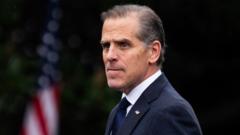The revocation of security clearances for 37 current and former US intelligence officials by Tulsi Gabbard has stirred significant political controversy. Trump claims the officials betrayed public trust, while critics argue it's a diversion from more pressing issues.
Gabbard Revokes Security Clearances Amid Political Controversy

Gabbard Revokes Security Clearances Amid Political Controversy
Tulsi Gabbard, acting on behalf of President Trump, revokes security clearances of 37 US intelligence officials, citing politicization of intelligence.
Tulsi Gabbard, the Director of National Intelligence, has made headlines by revoking the security clearances of 37 current and former US intelligence officials, an action she stated was directed by President Donald Trump. Gabbard's memo, shared on social media, accuses these officials of politicizing intelligence for personal or partisan gain. This decision affects several individuals who served in national security roles under past Democratic administrations, notably those of Presidents Joe Biden and Barack Obama.
In her statement, Gabbard did not provide specific evidence supporting her accusations, which included claims of leaking classified intelligence and other serious violations. The significance of security clearances cannot be understated, as they allow access to sensitive government information, with some former officials retaining them to guide their successors or transition into private sector roles in defense and aerospace.
Gabbard emphasized that holding a security clearance is a privilege contingent upon loyalty to the Constitution and the American people's interests. She suggested those who breach this trust by politicizing their roles have forfeited their right to these clearances. The memo, however, did not detail specific allegations against the affected individuals, leading to questions about the nature and validity of these claims.
This move is not unprecedented for the Trump administration; previous clearances have also been revoked from key figures, including Biden and his Vice President Kamala Harris, especially in the context of the investigations into the January 6 Capitol unrest. Gabbard has recently been vocal against intelligence officials who, under Obama, confirmed Russian interference in the 2016 elections, with Trump labeling these findings a "treasonous conspiracy."
Reactions to Gabbard's actions have been sharply divided along political lines. While supporters of the Trump administration view it as a necessary step to maintain integrity within the intelligence community, critics—especially from the Democratic Party—have dismissed the accusations as politically motivated distractions from larger national concerns. A spokesperson for Obama characterized the allegations as overly bizarre and an ineffective attempt to divert attention from the administration's unpopular policies.
As this controversy develops, the implications for both the individuals affected and the broader trust in the intelligence community remain to be seen.





















